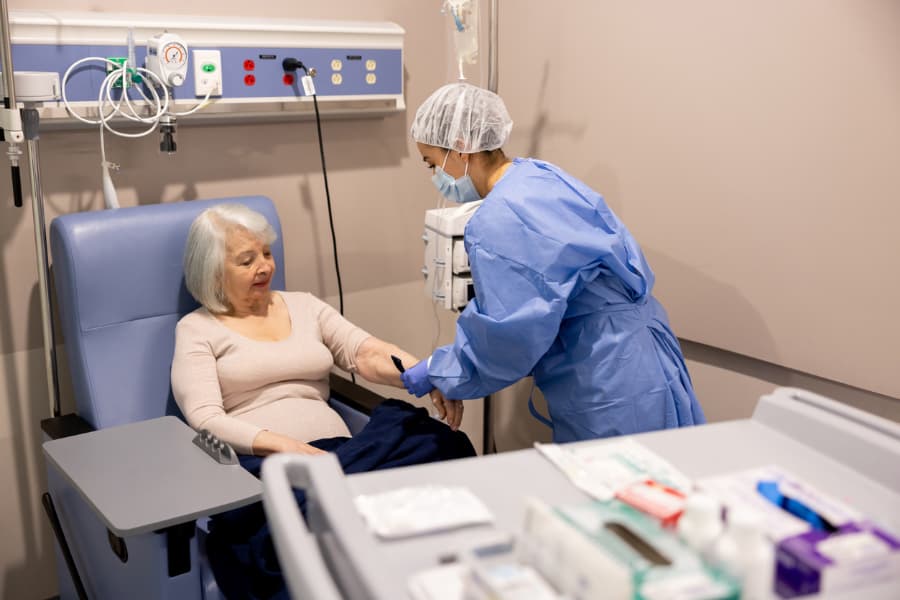
Six RCCA physicians distinguished as Top Doctors for Women’s Health
A reputation for excellence requires commitment to dedication, long hours, compassion and the motivation to excel.
HIPAA Alert: Potential Data Breach Learn More
Questions on Oncology, Hematology and/or Infusion Clinical Services due to COVID-19 Crisis – CALL 833-698-1623
Important Information for Our Patients Regarding the Coronavirus.
RCCA Providing Area Cancer Patients with Access to Care During Coronavirus Outbreak
RCCA Offering Patients Virtual Visits During Coronavirus Pandemic
Cancer is the uncontrolled growth of abnormal cells in the body, and these growing cells may form tumors. Normal physical functions may be affected as the tumors impact or harm organs and other tissue in the body. When cancer is discovered, a thorough diagnosis and personalized treatment plan are required. The expert medical teams at Regional Cancer Care Associates (RCCA) provide the latest ovarian cancer treatments for patients throughout New Jersey, Connecticut, Massachusetts, and the Washington, D.C., area.
The ovaries are female reproductive glands located on either side of the uterus. They produce eggs and two hormones: estrogen and progesterone. These hormones serve important functions in the body and are key to reproduction. Genetic mutations that result in abnormal cell growth in and near the ovaries can cause ovarian cancer to develop. There are three main types of tumors that develop from these mutated cells: epithelial, germ cell, and stromal. When ovarian cancer is found, doctors must “stage” the cancer – meaning determining its nature and extent – to select the best course of treatment.

At Regional Cancer Care Associates, our doctors and other medical professionals provide evidence-based, cutting-edge treatment for ovarian cancer. Our medical oncologists also are available to provide a second opinion to confirm an ovarian cancer diagnosis and to offer expert perspectives on the optimal treatment plan. We carefully stage the cancer, drawing on biopsy results, imaging studies, and other information to identify the type of tumor involved and determine whether it remains contained to the area where it developed or has spread. Consideration of the cancer’s Stage and the patient’s overall health is critical to formulating and implementing an individualized treatment plan.
Surgery and chemotherapy are the two types of treatments used most often in managing ovarian cancer. These approaches may be used together or separately. Additional therapies are utilized when beneficial to the patient with ovarian cancer. The main options are:
Surgery is used to remove cancerous cells, including any tumors that may have formed. One or both ovaries may be removed, as well as the fallopian tubes. Often a hysterectomy, or removal of the uterus, also is required. Removal of the ovaries causes early onset of menopause, because the body no longer has its main source of estrogen and progesterone. When tumors are large, or if cancer has spread within the abdomen, it is sometimes necessary to also remove portions of the colon, small intestine, bladder, or other organs.
Chemotherapy uses toxic drugs to shrink tumors and kill cancer cells. Patients receive these treatments intravenously, by injection into specific areas of the body, or by swallowing pills or liquids taken by mouth. This treatment approach may be used to shrink tumors and any other cancerous cells before surgery. Reducing the size of a tumor may enhancing patients’ physical functions and quality of life, and the smaller tumor volume may make it easier for surgeons to remove the cancer during an operation. Chemotherapy also can be used postoperatively to kill any remaining cancer cells. Chemotherapy is usually administered in a series of treatments. Patients often experience side effects from chemotherapy, but oncology practices have effective means of minimizing and managing symptoms.
Radiation therapy is less commonly used to treat ovarian cancer. However, if cancer has spread, external beam radiation therapy may be used to kill cancer cells in the reproductive organs or other parts of the body. Treatments usually are administered over several weeks. While the actual radiation therapy treatments are painless, patients may experience side effects.
Targeted therapy is a fairly new approach utilized in some ovarian cancer treatment plans. As their name implies, targeted therapies act against specific mutations driving cancer growth, and so have an effect only on cells with these mutations rather than on nearby healthy cells . There are often side effects related to targeted therapy.
Immunotherapies harness the power of the body’s own immune system to identify and attack cancerous cells. While immunotherapy has become a prominent component of the treatment plan for many cancers, its use in ovarian cancer currently is fairly limited and generally reserved for advanced cases. However, as further research is conducted, immunotherapy may become a more widely used option for ovarian cancer in the years ahead.
As is the case with all cancers, early diagnosis and treatment of ovarian cancer is key to achieving the best possible outcomes. One obstacle to early diagnosis, however, is that many of the initial symptoms of ovarian cancer also are common to other more-frequent and less-serious conditions. These signs and symptoms include:
While these symptoms generally will not indicate the presence of ovarian cancer, they are signals that something is not right, and should be discussed with a healthcare professional.
Women who need ovarian cancer treatment will find compassionate, expert care at Regional Cancer Care Associates. We treat cancers and blood disorders in patients throughout New Jersey, Connecticut, Massachusetts, and the Washington, D.C., area. Contact us today to make an appointment at one of our many convenient office locations.
At Regional Cancer Care Associates (RCCA), we feature the best of modern oncologic medicine. We meet the highest standard of cancer care in both quality and safety. At the same time, we lead with our hearts, offering an environment characterized by compassion. We focus on you, individually, and work with you and your family to ensure your care is second to none.
For more information, please call (844) 346-7222. You can schedule an appointment by calling the RCCA location nearest you.

A reputation for excellence requires commitment to dedication, long hours, compassion and the motivation to excel.

If you’ve been diagnosed with prostate cancer, you’ll want to understand all your options and choose the approach that offers the best outcomes. For many

Cancers that develop in the throat, mouth, and nose region are collectively known as head and neck cancer. These can have a significant impact on
When standard cancer treatments aren’t providing the results you want, clinical trials may offer hope. Our physicians use clinical trials to study new treatments, helping transform cancer care for the better. You can enroll in a clinical trial to try groundbreaking treatment plans at zero cost to you.

Regional Cancer Care Associates is one of fewer than 200 medical practices in the country selected to participate in the Oncology Care Model (OCM); a recent Medicare initiative aimed at improving care coordination and access to and quality of care for Medicare beneficiaries undergoing chemotherapy treatment.